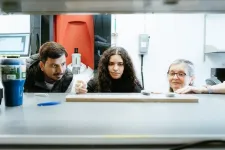(Press-News.org) Generally, things really do seem better in the morning, with clear differences in self-reported mental health and wellbeing across the day, suggest the findings of a large study published in the open access journal BMJ Mental Health.
People generally wake up feeling in the best frame of mind in the morning but in the worst around midnight, the findings indicate, with day of the week and season of the year also playing their part.
Mental health and wellbeing are dynamic in nature, and subject to change over both short and extended periods, note the researchers. But relatively few studies have looked at how these might change over the course of the day, and those studies that have, have included particular, or only small, groups, they add.
The researchers therefore wanted to explore whether time of day was associated with variations in mental health (depressive and/or anxiety symptoms), happiness (hedonic wellbeing), life satisfaction, sense of life being worthwhile (eudemonic wellbeing) and loneliness (social wellbeing). They also wanted to find out if these associations varied by day, season, and year.
They analysed data from the University College London COVID-19 Social Study, which began in March 2020, and involved regular monitoring until November 2021, and then additional monitoring up to March 2022.
All studied aspects were measured via questionnaires using validated assessment tools or through single direct questions: “In the past week, how happy did you feel; how satisfied have you been with your life; to what extent have you felt the things you are doing in your life are worthwhile?”
Time stamps on completion of each survey provided information on time of day (continuous from 6 am to midnight); day of the week; season; and year (2020, 2021, 2022).
Information on other potentially influential factors included age groups (18–29, 30–45, 46–59, 60+), gender, ethnicity, educational attainment, employment status, residential area (rural, urban) and diagnosed physical and mental health conditions (yes, no).
Complete information was available for 49, 218 people, three quarters of whom (76.5%) were women. People educated to degree level or above were over represented (68%) while those from ethnic minority backgrounds were under represented (6%). The sample was therefore weighted to reflect population proportions.
Analysis of the data revealed a clear pattern in self-reported mental health and wellbeing across the day, with people generally waking up in the morning feeling best—lowest depressive/anxiety symptoms and loneliness and highest happiness, life satisfaction, and worthwhile ratings—and feeling worst around midnight.
The influence of day of the week was less clear-cut, with more variation in mental health and wellbeing during weekends than on week days.
Happiness, life satisfaction, and worthwhile ratings were all higher on Mondays and Fridays than on Sundays, and happiness was also higher on Tuesdays. But there was no evidence that loneliness differed across days of the week.
There was clear evidence of a seasonal influence on mood, however. Compared with winter, people tended to have lower levels of depressive and anxiety symptoms and loneliness, and higher levels of happiness, life satisfaction, and feeling that life was worthwhile in other seasons.
And mental health was best in the summer across all outcomes. But the season didn’t affect the associations observed across the day, however.
Mental health and wellbeing also steadily improved from 2020, the first year of the COVID-19 pandemic.
This is an observational study, and as such, can’t establish cause. And when people chose to fill in their questionnaires might have influenced the findings, say the researchers. No information was available for sleep cycles, latitude, or weather, all of which may also have been influential, they add.
But the changes in mental health and wellbeing across the day might be explained by the physiological changes associated with the body clock, they suggest.
“For example, cortisol peaks shortly after waking and reaches its lowest levels around bedtime. However, it is important to acknowledge the differences between weekends and weekdays,” they write.
“Given there is little evidence that physiological processes differ across different days of the week, differences might be related to other factors that drive [mental health and wellbeing] changes over the course of the day. This could include contextual factors and sequence of daily activities, which are likely to be different between weekends and weekdays.”
The similar time of day patterns in mental health and wellbeing, irrespective of the seasons, is surprising, as one of the main reasons for seasonal changes in frame of mind is the number of daylight hours, say the researchers.
“Other drivers of the seasonal variation in [mental health and wellbeing] could include weather (temperature, precipitation, humidity) as well as various sociocultural cycles, including cultural holidays, norms, and employment patterns,” they suggest.
The findings have implications for service delivery and clinical assessments, say the researchers. “Finally, in relation to public health, our findings indicate that people’s [mental health and wellbeing] tends to be lowest around midnight, mid-week, and in winter. This should be considered when planning service and resource provision.”
END
Generally, things really do seem better in morning, large study suggests
Clear time of day patterns in frame of mind: best early on; worst late at night
2025-02-05
ELSE PRESS RELEASES FROM THIS DATE:
Juicing may harm your health in just three days, new study finds
2025-02-04
“Most people think of juicing as a healthy cleanse, but this study offers a reality check”
CHICAGO --- Think your juice cleanse is making you healthier? A new Northwestern University study suggests it might be doing the opposite. The study, recently published in Nutrients, found that a vegetable and fruit juice-only diet — even for just three days — can trigger shifts in gut and oral bacteria linked to inflammation and cognitive decline.
How was the study conducted?
Northwestern scientists studied three groups of healthy adults. One group consumed only juice, another had juice with whole ...
Forest landowner motivation to control invasive species depends on land use, study shows
2025-02-04
URBANA, Ill. – Many U.S. forests are privately owned, particularly in the Eastern and North Central part of the country. This makes control of invasive plants and pests challenging because efforts must be coordinated across landowners. A new study from the University of Illinois Urbana-Champaign explores how differences in ownership motivation affects willingness to control, and how economic incentives can be implemented most efficiently.
“Some own the land for recreational purposes, some own it because they want to produce timber, and some are a combination of both. If one landowner controls invasive species ...
Coal emissions cost India millions in crop damages
2025-02-04
In many parts of India, a single noxious pollutant from coal-fired power stations drags down annual wheat and rice yields by 10% or more, according to a new study by Stanford Doerr School of Sustainability researchers.
The two grains are critical for food security in India, the second most populous country in the world and home to a quarter of all undernourished people globally.
“We wanted to understand the impact of India’s coal electricity emissions on its agriculture because there might be ...
$10.8 million award funds USC-led clinical trial to improve hip fracture outcomes
2025-02-04
The University of Southern California has been approved for $10.8 million in research funding by the Patient-Centered Outcomes Research Institute (PCORI) to compare approaches to treating older adults with a fracture of the hip. Led by principal investigator Joseph Patterson, MD, an orthopaedic surgeon specializing in fracture care at Keck Medicine of USC, the “FASTER-Hip” trial aims to determine whether patients with a certain type of hip fracture fare better with a hip replacement or a simpler surgery known as internal fixation.
The trial leadership team includes ...
University Hospitals Cleveland Medical Center among most reputable academic medical centers
2025-02-04
CLEVELAND -- University Hospitals Cleveland Medical Center is one of the most recognizable hospitals among doctors in the U.S. and around the world, according to an annual survey.
UH Cleveland Medical Center was ranked eighth in the U.S. and 16th globally in a survey of the strongest Academic Medical Center brands, according to Brand Finance, a London-based brand valuation consultancy.
“This ranking is a reflection of all we do at University Hospitals to provide compassionate care for patients, work to find the next generation of therapies and treatments, invest ...
Emilia Morosan on team awarded Kavli Foundation grant for quantum geometry-enabled superconductivity
2025-02-04
Rice University physicist Emilia Morosan is part of an international research collaboration that has been awarded multimillion-dollar funding from The Kavli Foundation to develop and test next-generation superconductors through artificial intelligence and quantum geometry. This global initiative, spearheaded by Päivi Törmä of Aalto University in Finland, seeks to push the boundaries of quantum materials science and superconductivity.
The project includes funding from the Klaus ...
Unlock sales growth: Implement “buy now, pay later” to increase customer spending
2025-02-04
Researchers from Imperial College Business School and University of Leeds published a Journal of Marketing study that examines the impact of BNPL installment payments on retail sales. The study, forthcoming in the Journal of Marketing, is titled “Buy Now Pay Later: Impact of Installment Payments on Customer Purchases” and is authored by Stijn Maesen and Dionysius Ang.
Buy-Now-Pay-Later (BNPL) is an increasingly popular payment method, allowing customers to spread payment into interest-free installments over a few weeks or months. Worldwide ...
Research team could redefine biomedical research
2025-02-04
Professor Leslie Wolf, a Distinguished University Professor and Ben F. Johnson Jr. Chair in Law at Georgia State University College of Law, is a part of a research team that has been provided $1.9 million to conduct research designed to increase participation in biomedical studies by involving participants in the research design process. The award has been approved pending completion of a business and programmatic review by PCORI staff and issuance of a formal award contract.
Wolf, along with colleagues at the ...
Bridging a gap in carbon removal strategies
2025-02-04
Biochar: bridging a gap in carbon removal strategies
As the world works to meet net-zero carbon goals, a new study offers a critical reminder: precision matters. The researchers suggest refining how we assess a natural carbon storage strategy to ensure the technology lives up to its potential as a climate change solution.
Biochar, a charcoal-like material derived from plant biomass, has long been hailed as a promising tool for carbon dioxide removal. However, a new study by Stanford researchers highlights a critical issue: current methods for assessing biochar's carbon storage potential may significantly undervalue its true ...
Outside-in signaling shows a route into cancer cells
2025-02-04
A new study shows how an anticancer drug triggers an “outside in” signal that gets it sucked into a cancer cell. The work, published Jan. 29 in Nature Communications, reveals a new signaling mechanism that could be exploited for delivering other drugs.
Many malignant cancers overexpress a protein called P-cadherin, which is embedded in the cell membrane. Because cancer cells have a lot of P-cadherin sticking out of their surface, the protein has been targeted for drug development.
Monoclonal antibodies against P-cadherin can carry a drug payload to the cancer cells. It has not been clear, though, exactly how the antibodies attach to P-cadherin ...
LAST 30 PRESS RELEASES:
Chimps’ love for crystals could help us understand our own ancestors’ fascination with these stones
Vaginal estrogen therapy not linked to cancer recurrence in survivors of endometrial cancer
How estrogen helps protect women from high blood pressure
Breaking the efficiency barrier: Researchers propose multi-stage solar system to harness the full spectrum
A new name, a new beginning: Building a green energy future together
From algorithms to atoms: How artificial intelligence is accelerating the discovery of next-generation energy materials
Loneliness linked to fear of embarrassment: teen research
New MOH–NUS Fellowship launched to strengthen everyday ethics in Singapore’s healthcare sector
Sungkyunkwan University researchers develop next-generation transparent electrode without rare metal indium
What's going on inside quantum computers?: New method simplifies process tomography
This ancient plant-eater had a twisted jaw and sideways-facing teeth
Jackdaw chicks listen to adults to learn about predators
Toxic algal bloom has taken a heavy toll on mental health
Beyond silicon: SKKU team presents Indium Selenide roadmap for ultra-low-power AI and quantum computing
Sugar comforts newborn babies during painful procedures
Pollen exposure linked to poorer exam results taken at the end of secondary school
7 hours 18 mins may be optimal sleep length for avoiding type 2 diabetes precursor
Around 6 deaths a year linked to clubbing in the UK
Children’s development set back years by Covid lockdowns, study reveals
Four decades of data give unique insight into the Sun’s inner life
Urban trees can absorb more CO₂ than cars emit during summer
Fund for Science and Technology awards $15 million to Scripps Oceanography
New NIH grant advances Lupus protein research
New farm-scale biochar system could cut agricultural emissions by 75 percent while removing carbon from the atmosphere
From herbal waste to high performance clean water material: Turning traditional medicine residues into powerful biochar
New sulfur-iron biochar shows powerful ability to lock up arsenic and cadmium in contaminated soils
AI-driven chart review accurately identifies potential rare disease trial participants in new study
Paleontologist Stephen Chester and colleagues reveal new clues about early primate evolution
UF research finds a gentler way to treat aggressive gum disease
Strong alcohol policy could reduce cancer in Canada
[Press-News.org] Generally, things really do seem better in morning, large study suggestsClear time of day patterns in frame of mind: best early on; worst late at night



